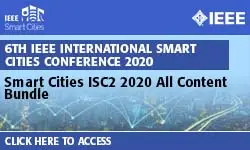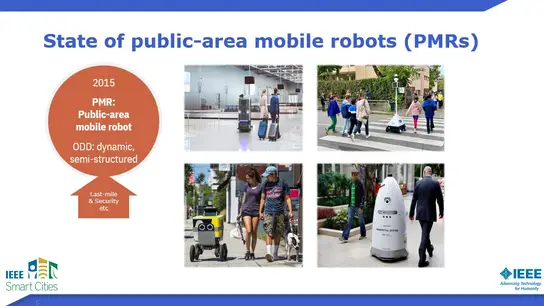Workshop 2: The 3rd International Workshop on BLockchain Enabled Sustainable Smart Cities (BLESS 2020)
Yu Chen, Sachin Shetty
-
Members: $30.00Sponsoring Society
IEEE Members: $45.00
Non-members: $60.00Length: 01:43:22
Workshop
28 Sep 2020
Enabled by the proliferation of the Internet of Things (IoT), edge-fog-cloud computing, and interconnected networks, smart cities are capable of innovative solutions to change the lifestyles of its residents. Unavoidably the potential bene?ts come along with new challenges and concerns related to information security and privacy. Blockchain technology is a platform that would provide tamper-proof storage for data derived from smart cities and ensure the access to the data is tracked and provided to authorized users. The resultant chain of custody will provide an interoperable platform that would facilitate decisions in smart cities that would impact the communities. The transparency of the platform would provide citizens would go a long way in building trust and ensure that the businesses will held to high standards of accountability.Specifically, BLESS’2020 highlights the roles that blockchain technology plays in the smart cities, it is cross-disciplinary and covers multiple area including information security, infrastructure security, facilities, communication networks, data storage, distributed computing, and more. This workshop gathers researchers from these areas together to foster the collaboration among such interdisciplinary areas and to spark discussion on open topics related to blockchain enabled applications in smart cities.This year, BLESS 2020 workshop consists of an oral presentation session with four talks.Presentation 1: Invited Paper: Detecting Counterfeit ICs with Blockchain-based Verification FrameworkCounterfeit electronic parts have posed a serious threat to consumers, industry, and government and military agencies for a long time. They not only lead to massive damage in terms of financial and reputation losses, but can also create high risk in the compromise of system safety and integrity. Our previous work shows the possibility of achieving the decentralized runtime verification by incorporating some mechanisms of the blockchain technology into a distributed system for locating the accountability when error occurs. In this paper, we propose to develop a verification framework based on blockchain technology to detect the abnormalities of counterfeit ICs at every stage of their lifecycles, including after being deployed into the system. We design an efficient and effective method that can store the inspection and testing results into a blockchain, and apply the smart marker scheme which can merge separate blockchains associated with individual ICs into one blockchain after the ICs are installed onto the same system.Presentation 2: Bassa - Scalable Blockchain Architecture for Smart CitiesSmart cities deal with connected things which produce large amounts of data. Their applications need to support high scalability, high transaction throughput, high backend load, and data analytics features. The data accumulated in smart cities are highly critical since it can be used to improve the operations across the cities. To guarantee the security and privacy of the data generated in smart city applications, blockchain-based decentralized infrastructure can be adopted. However when integrating existing blockchain systems with smart city applications, one encounters many challenges. Current blockchains do not support high transaction throughput; it does not provide high scalability; it does not provide realtime transaction processing; it does not provide full-text search query APIs; it does not handle back-end stress operations and so on. As a result, it is hard to incorporate existing blockchain systems for smart city applications. In this paper, we propose a highly scalable blockchain platform, “Bassa”, for smart city applications, which supports real-time transaction enabled “validate-execute-group” blockchain architecture to increase the transaction throughput of the blockchain. It comes with a functional programming and actor-based smart contract platform that enables concurrent execution of transactions in the blockchain. Bassa supports high transaction throughput, high scalability, concurrent transaction execution, data analytics and machine learning features on the blockchain. With Bassa, we provide a blockchain platform that can provide acceptable performance on the highly scalable applications (e.g Smart Cities).Presentation 3: BIT: A Blockchain Integrated Time Banking System for Community Exchange EconomyAdvancement in Artificial Intelligence (AI) and Big Data technologies is reshaping the global economy. The community currency network is receiving more attention through enhancing social ties within a community. As the most popular type of community currency, Time Banking (TB) is a generalized community exchange economy, which uses the time to evaluate participant’s contributions on the same scale rather than any equivalence with the official national currency. TB is a noble idea with the potential to improve the quality of life through reciprocally beneficial activities among community members. However, it also brings new concerns about security and trust issues. Inspired by blockchain and smart contract, this paper introduces a Blockchain Integrated Time Banking System (BIT) to secure a decentralized community exchange economy. In BIT system, the service providers and recipients can securely commit service exchange through the self-executing smart contract without relying on a third-party trust authority. Blockchain network ensures immutability, auditability, and traceability of all data and service transactions recorded on the distributed ledger. A proof-of-concept prototype is implemented and tested on a private Ethereum network. The experimental results verify the feasibility of the proposed BIT, which provides decentralized community service exchanges with limited computation overhead and network latency.Presentation 4: Toward Smart Contract for Solving NP-Complete Problems in Emerging Smart ApplicationsMany research problems are not solved because of the need for enormous computation complexity and time complexity. Crowd sourcing approach has been applied to bring people and resources together to accomplish complex tasks collaboratively. This research studies an alternate and viable approach for solving computationally intensive tasks. Public blockchain technology has demonstrated gigantic computing potential by the participation of computing machines around the world. In this talk, we propose an approach that utilizes the power of blockchain technology to find solutions or improvement to the existing solutions of NP-complete problems. Furthermore, out study focuses on how blockchain can be utilized to verify any given solutions. Specifically, in this work, we propose a smart contract based approach to deploy NP-complete problems in the blockchain network. The blockchain is utilized to compute the proposed solution given by anyone connected in the network. If any proposed solution or improvement on the existing solution meets specified criteria, it is permanently stored in the blockchain. For a valid solution, the solver gets the reward for providing a valid solution that could be used by many other participating units.
Primary Committee:
IEEE Smart Cities Conferences



